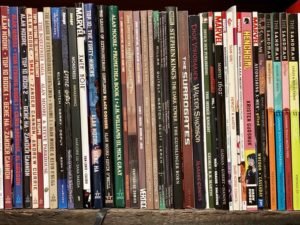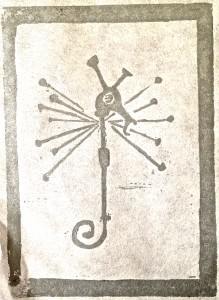
- I know I pushed Jeff VanderMeer’s Wonderbook last year, but I’m going to push it again, because it’s just such a cool book and Jeremy Zerfoss’s illustrations are so wacky, wildly beautiful, and wonderful. There aren’t that many books on writing I’d be willing to go back to over and over again, but this is one.
- A SFWA membership if they’re eligible, a subscription to Locus Magazine if they’re not. For me, the Science Fiction and Fantasy Writers of America have been a source of professional networking, career advice, and some great friends. If you go to Worldcon, the SFWA suite has always been a welcome place to hang, nosh a little, and talk to some of the greats. In the interest of full disclosure, I am currently the organization’s Vice President, and I’m looking forward to great things next year, which is SFWA’s 50th. If they’re still aspiring, encourage them with a subscription to the F&SF trade journal, Locus Magazine
- An anthology (particularly if they write short fiction). One of my favorites from this year was edited by Gardner Dozois and George R.R. Martin, Dangerous Women. If you’re interested in something that I’ve got a story in, the anthologies I appeared in this year were By Faerie Light, Fiction River: Past Crime, Shattered Shields, Stamps, Tramps, and Vamps, and Unidentified Funny Objects 3.
- Something to fiddle with. A puzzle, a worry stone, a Lego minifig. Writers are often superstitious creatures and we like our little totems, whether they’re pop culture icons or natural objects.
- A ticket somewhere. Get your writer out of the house and somewhere that will provide new ideas. Doing it on the cheap? Plan a day trip with a picnic basket? More extravagant? Well, there’s plenty of choices there, from riding the Orient Express to cruising the world. Tailor your destination to the recipient.
#sfwapro




 I tweeted this image recently along with the tag-line, “What’s missing? Tell me your favorite graphic novel.” I got literally hundreds of replies, and since I’m going through the list to compile one for me in order to fill out my library a bit, I figured I’d do it as a blog post and thus hit two birds with a single stone. I’m still updating and adding as more people respond to the original post. But if you’d like to know what my Twitter following recommended, here’s the list.
I tweeted this image recently along with the tag-line, “What’s missing? Tell me your favorite graphic novel.” I got literally hundreds of replies, and since I’m going through the list to compile one for me in order to fill out my library a bit, I figured I’d do it as a blog post and thus hit two birds with a single stone. I’m still updating and adding as more people respond to the original post. But if you’d like to know what my Twitter following recommended, here’s the list.
2 Responses
“Writers are often superstitious creatures and we like our little totems, whether they’re pop culture icons or natural objects.”
Glances down at lucky bracelet….
So true.
We all have our little charms and shrines, I think. Or the majority of us, at least.